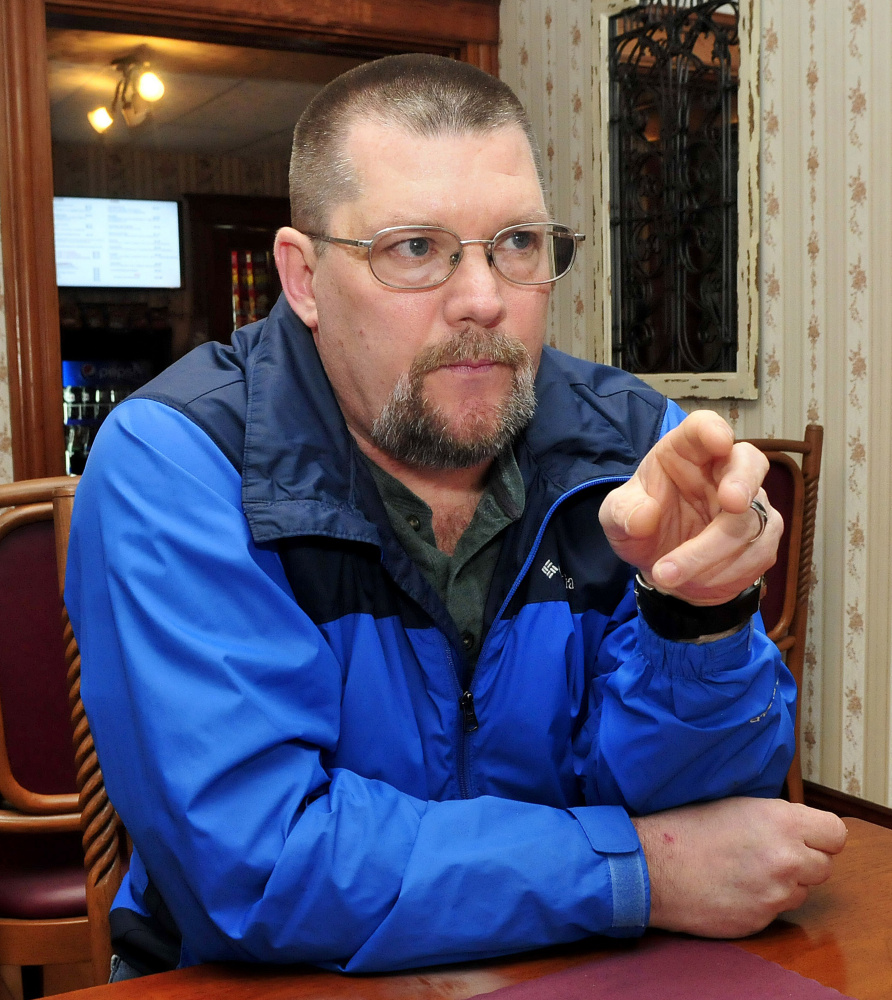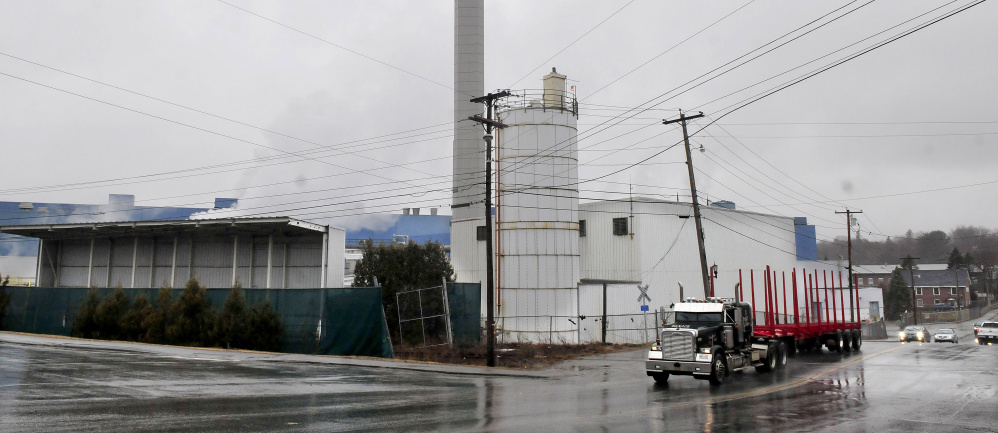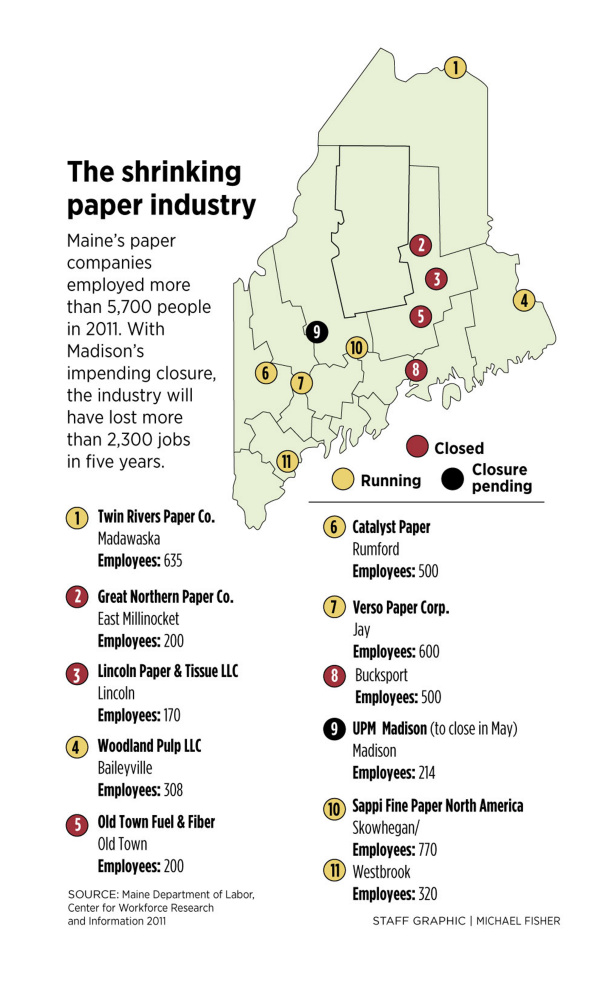MADISON — “We are done.”
Those are the three words that Scott Daubenberger received from a co-worker in a text message Monday morning telling him that the Madison Paper Industries mill would be closing and they would both be losing their jobs.
His 8-year-old granddaughter celebrated the news, happy that she would have more time to spend with her “Grump,” or grandfather. But for Daubenberger, his wife and his son Patrick — who also works at the landmark Madison mill that employs more than 200 — the message was harder to process.
“We’ll all get through it, but it’s going to be tough,” said Daubenberger, 52, of Madison, who’s worked at the mill for 11 years. “We’ve lost our jobs and they were very good paying jobs.”
The Madison paper mill, a subsidiary of parent company UPM-Kymmene Inc., announced Monday that it will be closing its doors in May and laying off all of its roughly 214 employees. The company cited dwindling demand for supercalendered paper, the glossy magazine paper made at the Madison mill.
The announcement makes Madison the fifth paper mill across the state to close in the last two years, a situation that U.S. Sens. Susan Collins and Angus King on Tuesday called an “economic crisis” and that King likened to a force of nature, calling it an economic “hurricane.” After Madison closes, there will be just six operating paper mills left in Maine, down from 11 mills at one point.
As workers such as the Daubenbergers grapple with that they’ll do next, state lawmakers and officials say they are working to mobilize resources to help laid-off workers as well as exploring what can be done to preserve Maine’s forestry and paper industry jobs.
But even as lawmakers vowed to help the nose-diving industry, they squabbled with each other Tuesday in a flurry of statements to the news media after Gov. Paul LePage convened a morning meeting with the Somerset County delegation and legislative leaders.
The Maine Department of Labor’s rapid response team began meeting with Madison company officials, setting up a plan for requesting trade assistance and help workers find new employment. The state program also was mobilized to help laid-off workers from the Androscoggin Mill in Jay when Verso Corp. announced cutbacks in August.
Meanwhile, the future of the Madison mill facility remains unclear. Rosaire Pelletier, a forest products industry liaison for the Maine Department of Economic and Community Development and the governor’s account executive, said in an interview Tuesday that he has discussed the closure with mill officials who said they did not want to sell the mill to a competitor who would also make supercalendered paper.
Russ Drechsel, president and CEO of Madison Paper Industries, did not return calls seeking comment Monday or Tuesday. In a news release Monday, the company said it plans to sell the 27-megawatt hydropower generation facility associated with the mill but made no reference to the papermaking machinery or mill itself.
It is unlikely that a buyer could be found for the mill, given that the market for supercalendered paper is declining and it would be expensive to convert the mill to another use, Pelletier said.
“It’s a nice little mill and there are 200 jobs at stake, but it’s not going to be easy,” Pelletier said. “Right now you cannot make money making supercalendered paper. Even if they wanted to sell it, I don’t think we could find a buyer to make that. But there are other products that could be made there that could make money.”
ECONOMIC DEVELOPMENT FOCUS
One local manufacturer, Cousineau Wood Products, which makes laminated gun stocks in Anson and has been expanding over the last few years, expressed sympathy Tuesday for the laid-off workers of Madison Paper Industries on Facebook and invited Madison employees to apply for open jobs.
Now the company has openings for an inventory and data specialist and for first and second shift press operators. At the same time Madison Paper has seen curtailments and cutbacks and now closure, Cousineau has been steadily growing. About 75 percent of the wood used to make their products comes from Maine.
The company had about 20 employees in 2014 before expanding to 55 workers and round-the-clock shifts in 2015. There are now about 85 employees and the company is looking to add 25 to 50 jobs by the end of the year, Vice President Brody Cousineau said in an interview Tuesday.
“I’ve called a couple of state senators and left messages to see if there’s help out there for capital projects, grants or something to that effect,” Cousineau said. “We have the business. We just need help getting everything set up.”
Collins and King issued a letter Tuesday to U.S. Secretary of Commerce Penny Pritzker calling on the department to establish a multi-agency Economic Development Assessment Team focused on Maine’s forest-based economy.
“The closure of Madison Paper Industries underscores the need to launch renewed economic development efforts in communities across rural Maine,” the senators said in a joint statement. “From Bucksport to Lincoln and Millinocket, and now in Madison, our state has lost five mills in just the past two years, putting thousands of people out of work and creating an economic crisis that demands immediate action.”
The team would look to create economic development strategies that would lead to job growth in Maine’s rural communities.
“Maine possesses a gold mine of fiber, and much vitality remains in our forest products industry,” the senators said in a joint response to the question of what specific resources the team could look at for economic growth. “As we move forward, we truly need an all of the above approach that includes bio-energy, new products, composites, and small wood churning mills.”
LAWMAKERS MEET
Meanwhile, legislative leaders from both parties met Tuesday morning with Gov. LePage to talk about the pending closure of the Madison Industries Paper mill and challenges the state’s forestry products industry. They emerged with contrasting views about what the state can do and sharp words for each other.
Speaker of the House Mark Eves, D-North Berwick, and House Majority Leader Jeff McCabe, D-Skowhegan, said in a statement they were encouraged to discuss the issues with LePage but accused the governor of offering “little in the way of constructive ideas and instead used the meeting as an opportunity to rant and rave about how the Legislature doesn’t like his ideas about taxes and energy.”
LePage followed up with another letter later Tuesday afternoon, blasting Eves and McCabe, saying they “immediately whined to the media that we did not propose constructive solutions for creating jobs and improving our economy.”
“That is simply not true,” LePage wrote. “The real problem is our common-sense solutions do not fit within your socialist, job-killing agenda.”
House Republicans released their own statement after the meeting, in which state Rep. Brad Farrin, R-Norridgewock, said he was surprised Eves and McCabe “would characterize the meeting as unproductive and attack the governor.”
“When the meeting broke, it seemed that we had made some progress on a few issues and were planning to meet again to further the discussion,” Farrin said.
Sen. Rod Whittemore, R-Skowhegan, who represents District 3, which includes Madison, said in a statement Tuesday that he was pleased with the meeting and “we shouldn’t make this political,” while Senate Democratic Leader Justin Alfond, of Portland, also released a statement saying “the hundreds of families staring down unemployment because of the Madison mill closure, and all the others who will be affected, don’t need politics.”
Farrin echoed the governor’s message, saying that lawmakers need to focus on passing policies that make Maine more business friendly.
“We must lower the corporate income tax rate, lower energy costs and promote proper forestry management and tree growth here in Maine if we hope to stop this trend and attract businesses and job growth to Somerset County and all across Maine,” he said.
FUTURE FOR WORKERS
Scott Daubenberger said he isn’t sure yet where he will work or what he will do after the mill closes.
At 52 years old, he isn’t sure whether he has time to go back to school and learn a new trade. He started out working for wood products company Solon Manufacturing, where he stayed for 20 years until just before it closed. Then he worked as a dispatcher for a trucking company, then a Fairfield home oxygen delivery business, then a temporary job at Sappi Fine Paper in Skowhegan.
When he arrived at Madison Paper nearly 11 years ago, he had found a good job. “I thought when I got in there, it was the cat’s meow,” he said.
His 24-year-old son, Patrick, found out about the mill closure while just starting a vacation in New York state.
Patrick started working at the mill part time in 2009 while still in high school and earned an associate degree from Kennebec Valley Community College in pulp and paper manufacturing. He got a scholarship to KVCC. The mill helped him pay for his education.
“I didn’t know what I wanted to do when I was a senior in high school, and this just sort of fell into place,” Patrick Daubenberger said. “As far as work is concerned, it’s all I’ve ever done.”
Now he has a house and a truck payment, and while his girlfriend works as a waitress in Skowhegan, Patrick Daubenberger said the mill’s closure will be hard on them.
Finding a viable way to stay living in central Maine and make an income is a challenge that both father and son said they have already started to think about.
“I really don’t want to move,” said Patrick Daubenberger. “I like where I live. I like central Maine, so that’s the hardest part is trying to find something that you can make money at in central Maine. That’s what I’m trying to do right now is just look for whatever that might be.”
Rachel Ohm — 612-2368
Twitter: @rachel_ohm
Send questions/comments to the editors.







Comments are no longer available on this story